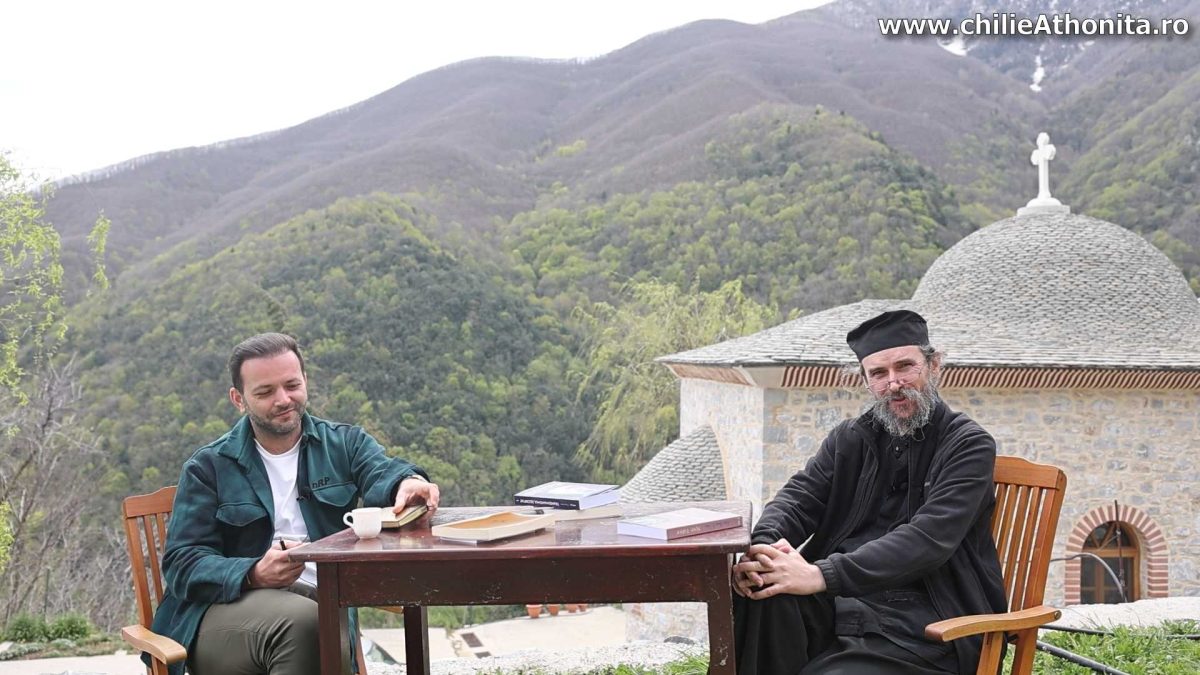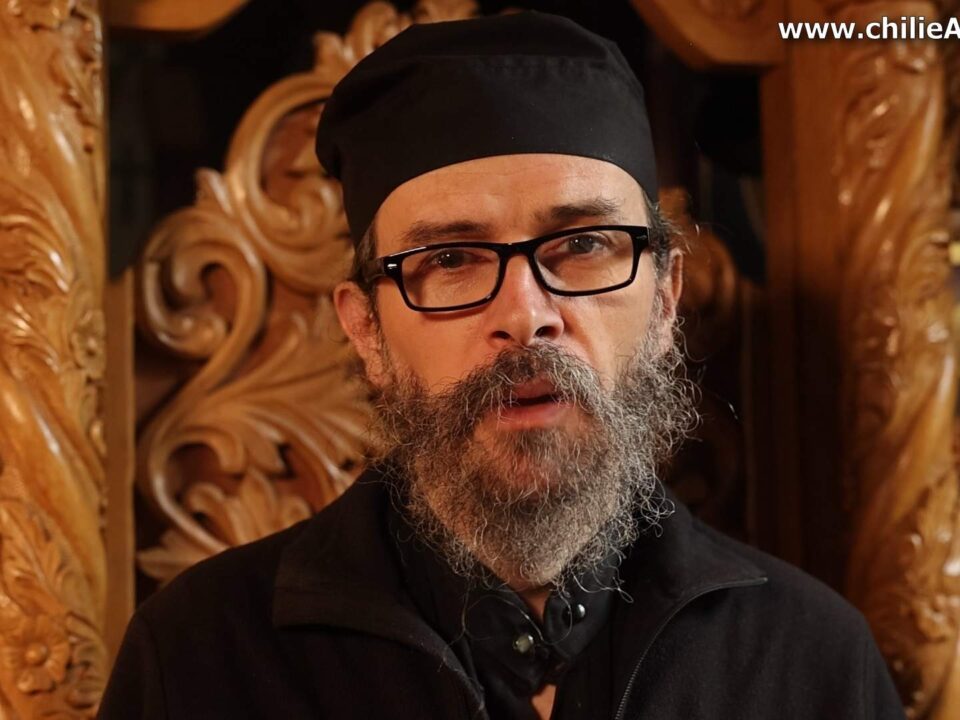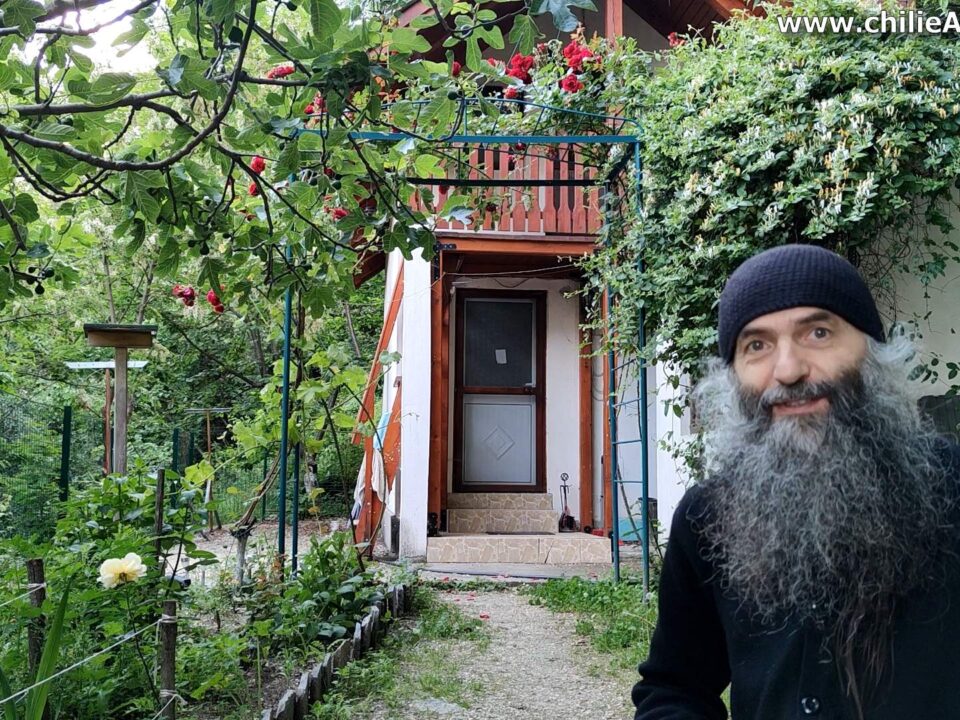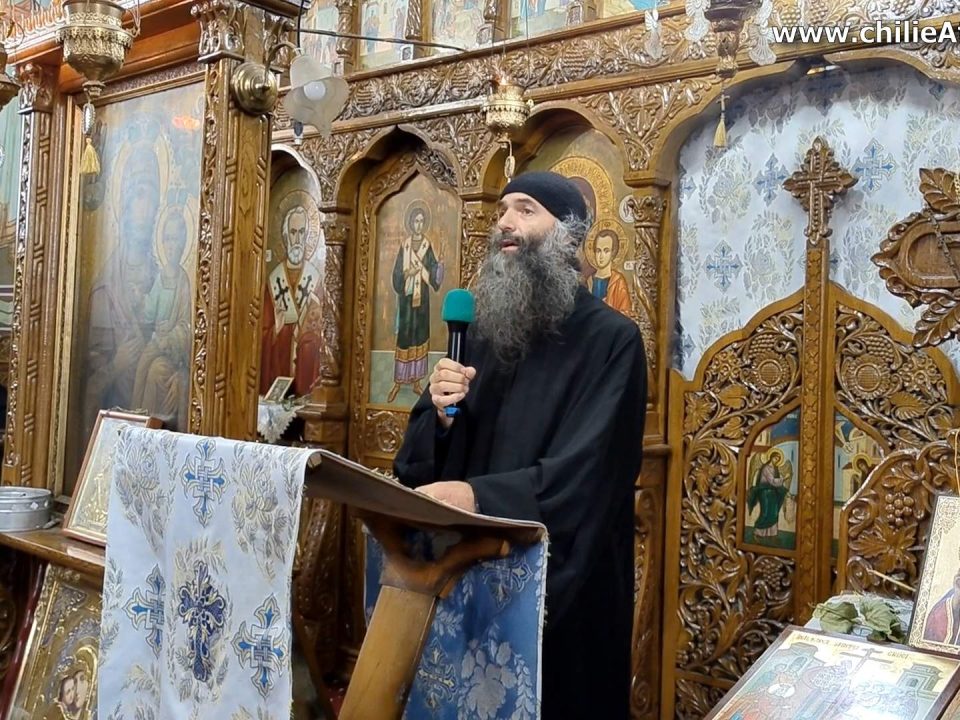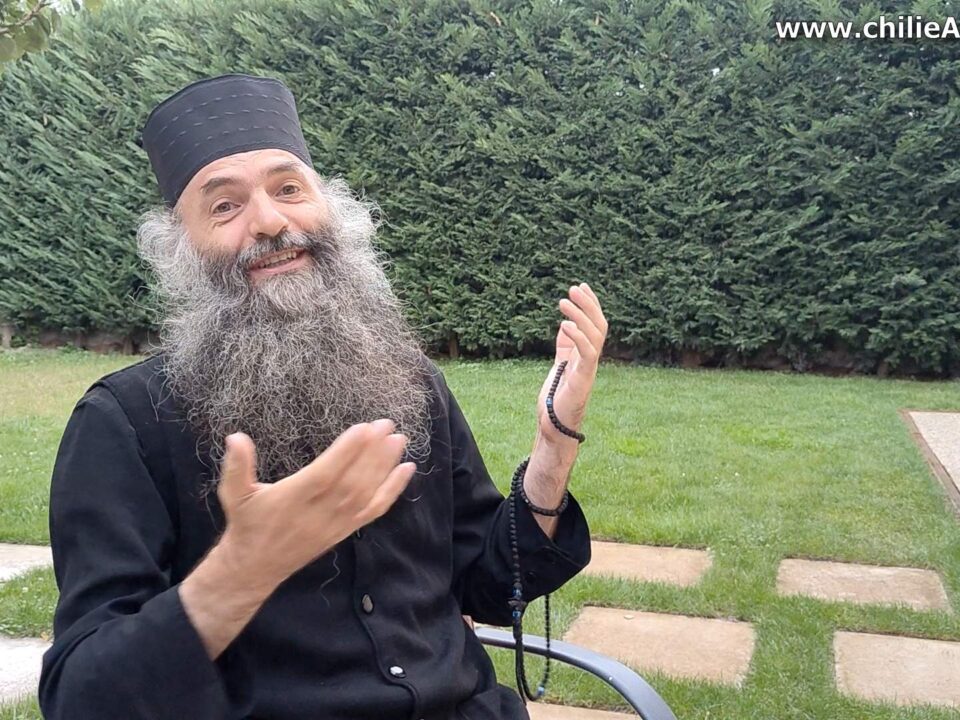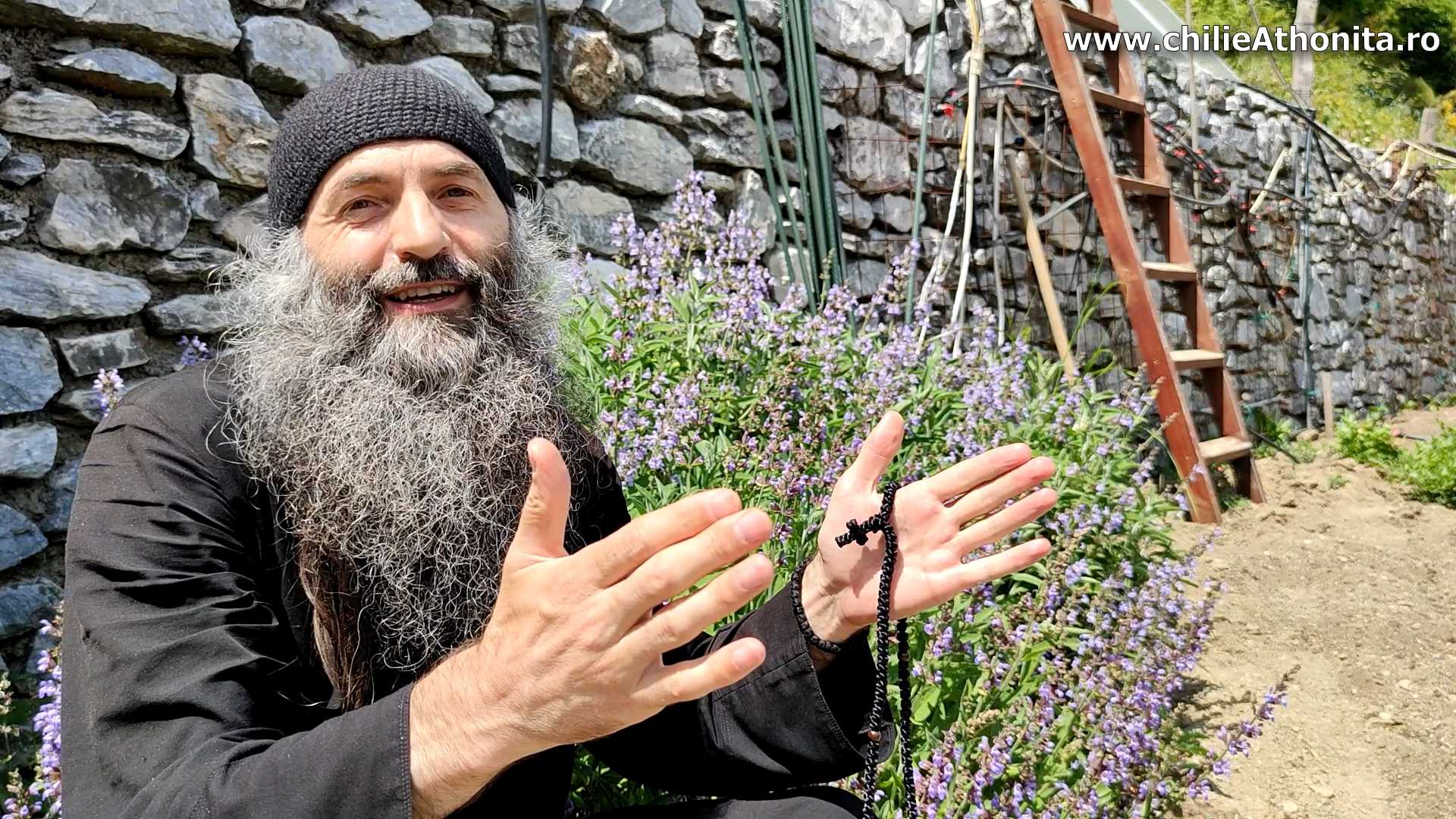
How Was Our Cell Built? – Father Pimen Vlad
19 May 2022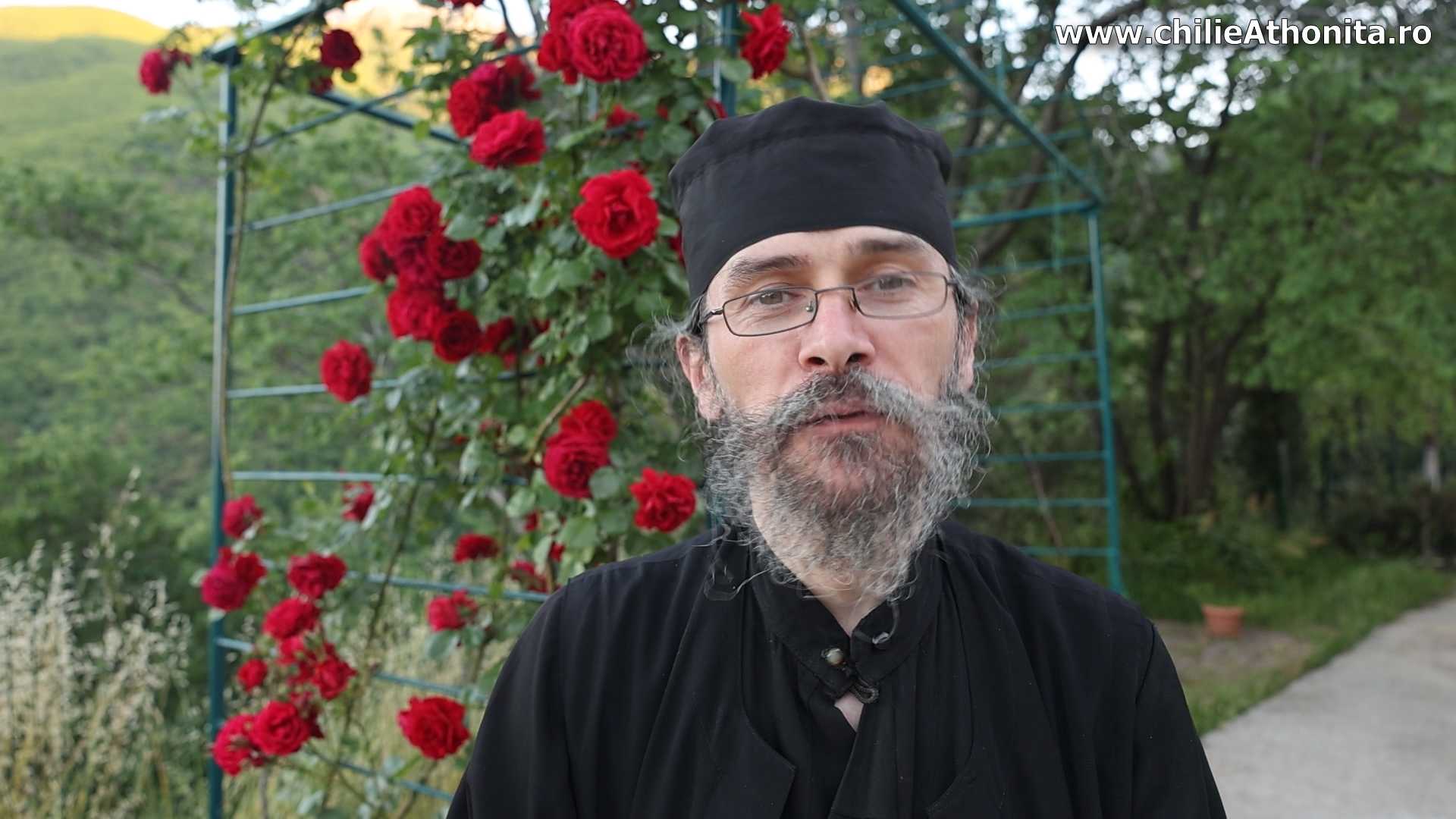
The Athonite Pilgrim’s Guide – Father Theologos
24 May 2022We continue with the 2nd part of our podcast with Mihai Morar in which he tells us what impresses him in others, where we stand as a nation and how we can improve. Of course, he does not escape making a brief analysis of the fake-news phenomenon.
Enjoy!
Father Theologos: Alright. I will ask him something else. This is the second part of our podcast, we will move on to people. Which of your guests have made a special impression on you and why? Or have you had an experience with a guest, or anyone else, or on the radio?
Mihai Morar: All my guests. All? All the guests who succeed in somewhat removing their masks.
Father Theologos: Sincerity, right?
Mihai Morar: This is the difference, and this was a shock for me, between TV and podcast. Because on TV the discussions are on the surface, superficial, because eventually they were between two commercial breaks. And you were always counted down in your headset, 5,4,3…commercial. And as a moderator you had to take a commercial break.
In a podcast you have time to unfold, to go into the person’s story…
Father Theologos: To be yourself..
Mihai Morar: To show the person that you care, that you care about them and that you are interested in their story. And sitting at the same table, I look for people that are most different from myself, because that is what I want to show through this podcast, that regardless of how different we are, we have many more points in common which…
Father Theologos: We have that global Adam that we spoke of.
Mihai Morar: That global Adam of which you spoke in the Fain&Simplu podcast which we recorded father. And that is what I want to get to, in that moment when the guest and I are at the same level of…
Father Theologos: Unity.
Mihai Morar: Some call it energy…
Father Theologos: It is very important that it is something personal and especially that it is God who helps us to do this work. It is in our nature, but without God we cannot. That is the big difference between us and Westeners. Westerners try to do this work through themselves. They do not succeed and that is their drama.
The Chinese, the Easterners try to do this through authority and that brings them to the martial arts, to the big problems that are found there – wars and so on. It won’t work out.
Only through God it is possible, that is, only through the consciousness of our eternity and the consciousness of a Loving Person above us who can level us and tell us that – yes, we can forgive!
Mihai Morar: The most successful interviews, podcasts, are the ones where the person in front of me manages to let go of their ego. That’s why I said masks.
Father Theologos: Yes, yes…
Mihai Morar: Call it ego, call it pride… and manage to offer themselves.
Father Theologos: Yes, yes.
Mihai Morar: Because that’s what I’m trying to offer them – to offer them that safe space. Put yourself in my hands, it’s my podcast, absolutely nothing happens to you, you can tell me anything, I’m not going to jump into your life because it’s not my style of interviewing, it’s not hard-talk.
Father Theologos: Yes, it’s not a question like some…
Mihai Morar: It’s not like: and now the red question…
Father Theologos: Yes, exactly, the million dollar question.
Mihai Morar: And they are shaking. That’s not how I’m trying to get into your life. And as long as you create this safe space for them, that’s what people need: to feel safe…
Father Theologos: To feel loved! People want to feel loved. And then they open up, then they bloom. And this is therapy with children: children need to feel loved! So parents must love their children, as I said, they must not betray them! That is, they must not leave the children at the mercy of the tablet. But just to love them. And love for children does not mean to listen to their every whim, but practically to grow them like a tree, like a flower.
Mihai Morar: I said this before, that children – in the image of the moment – children on tablets, on phones, is not a triumph of technology. It is parental abandonment.
Father Theologos: Of course. It’s a crash fix. The whole thing is a great drama.
I think we need to go back a bit, and because of that I think you will see that journalism, real journalism, must have a formative purpose. Meaning we have to be very responsible in what we do. We have to think: well, what am I doing now? Likes or traffic, views? Or am I trying to change people for the better? How can I change people for the better with what I do? How can I help, I don’t know…, Romania or my family or those around me, my audience? What can I do? Can I be therapeutic towards them? That’s what I think every journalist must ask themselves!
And not necessarily… What I really like as a pseudo-journalist is when we have a major event, a feast day…
Well, at that moment, I’m not in a hurry to be the first to post, in case someone dares to steal my news. No. But I have the editorial schedule that exists, I follow the editorial schedule, I pray, I go to my services, I prepare a useful word I also prepare the photo report and post it.
For example, at the Annunciation – it was Friday or I don’t know when the feast day was, I don’t even remember when it was – and the Annunciation post will be posted on Monday. About three days before, I posted a useful word about the Annunciation that was preparing for the Annunciation, and on Monday there will be a photo report from the Annunciation. Understand?
Mihai Morar: Actually, the failure of fake news, or this explosion of fake news is not only because of the fact that there are no more journalists in this profession, in journalism.
The failure is due to the fact that we have reached a point where everything has to be now, on the spot, live, moments ago, we have reached the point where the only thing that matters is who disseminates it first.
Father Theologos: Yes, and it’s terrible.
Mihai Morar: And not who gives the information.
Father Theologos: Exactly… Or someone who can help others. Why do you think people are so addicted, so attracted to live? It’s something absurd…
Mihai Morar: Because it is a form of voyeurism…
Father Theologos: Yes, yes.
Mihai Morar: Your life is so bad that you want to watch a reality show because actually everything is a reality show, even the war has become a reality show, that is, it is broadcast as a reality show.
Father Theologos: Yes, it’s terrible!
Mihai Morar: That’s what I wanted to say, we are voyeurs, our lives are so… gray… so gray that we want to see that others have grayer lives than us, and we like to see this live, to watch reality shows, to live in them instead of living our lives.
Father Theologos: And by this, in fact, we mortify ourselves, we renounce ourselves and we want to live the life of others or to see others, to see that they live worse than us, or to see that they live better than us and therefore also want to live like that.
Mihai Morar: That’s what I tried to avoid in these podcasts that I do: I didn’t want to give people a reality show. I wanted to give them reality, vulnerability on the part of my guests, but not for them to look at that story and say – “Aw, poor thing!”
Father Theologos: Yes, not to say “What happened to them!”
Mihai Morar: Yes. I didn’t want to show him “undressed” in front of people, but pure, vulnerable, sensitive…
Father Theologos: Human!
Mihai Morar: Human. And when people watch my podcasts, they see that their story is also my guest’s story.
Father Theologos: Yes…
Mihai Morar: And that there are so many stories in this world and many of us live the same stories and you are never alone…
Father Theologos: Yes, and that the others are like you, actually. Totally different, but like you.
Mihai Morar: You suffer. You are not the only one suffering.
Father Theologos: Yes that’s right. And so to have the courage to advance further… This is very important.
Have you met someone who on stage is one person and in reality is a much more beautiful person than on stage? Or is another person? You know what I mean.
Mihai Morar: Yes, and many people are beautiful, they are all beautiful…
Father Theologos: Yes, yes, all of them are beautiful, but some are extraordinary, so to speak.
Mihai Morar: Yes, you simply adore them and would like to sit with them and the moment the camera turns on, the microphone is on, they are afraid. In fact, it is the fear of showing themselves as they are. There are still such people. Or the fear to say some things. “Well, I don’t want to say some things so as not to disturb my audience.” You know?
Father Theologos: Yes… I think these things should be overcome.
Mihai Morar: And there are many people who are faithful, read books by the church fathers, go to church and they are afraid to say this directly in case they disturb the other side. … Which other side?
Father Theologos: To not bother them, and “them” is such an abstract gray cloud. Too bad… I think they shouldn’t have this complex, they shouldn’t have this fear… which is actually an animalistic fear, I mean, right? May God forgive me! We all have it, it’s inoculated in us. It’s not good.
I think this is one of the great problems of the Romanian nation: the inferiority complex.
Mihai Morar: Yes!
Father Theologos: The inferiority complex… And especially an inferiority complex towards… there is no one in particular.
Mihai Morar: I think that this inferiority complex also comes from the fact that if something happens to us, we embarrass ourselves. And that does happen.
Speaking of collaboration and Romanians, I recently made a podcast; We are neither more stupid nor more ugly than other people. Our problem is that we are not united and we do not know how to collaborate with each other for a common interest.
Father Theologos: That’s right! In enhancing the unity, in potentiating the love between us and in potentiating our efficiency…
Mihai Morar: We don’t have a Romanian team.
Father Theologos: Yes, yes… Romania’s National Team.
Mihai Morar: The National Team of Romania made up of Romanians is missing. Why do other people who have neither the natural framework nor our data…
Father Theologos: Not even our resources…
Mihai Morar: Not even our resources… Why are others far ahead of us? Because they knew to share the little they had and to multiply it.
Father Theologos: Good. The question is: How do you see this matter resolved? The unity. How do we unite?
Mihai Morar: How do we unite?…
Father Theologos: The million dollar question.
Mihai Morar: The million dollar question, thank you very much.
Father Theologos: Please forgive me! It was asked with love!
Mihai Morar: I think it comes from a little cultivation of trust. I do not know…
Father Theologos: The cultivation of faith.
Mihai Morar: Of faith. Because faith actually is…
Father Theologos: Of faith in the other, through God. Through God – as I said, the existence of a divine person who can forgive us and help us if the other attacks us or harms us, or we think is harming us, is paramount.
Mihai Morar: And if they hurts us, so what?
Father Theologos: So what? Understand? So what if he stepped on my foot 500 years ago…
Mihai Morar: I was talking in that podcast about trust in Romanians, with a colleague who said, “I was betrayed, I was stolen from throughout my career.” And I asked him this question at the end, “Ok, you’ve lost a friend, you’ve lost money, maybe you’ve lost a job – where are you right now? Are you happy with where you’re at?… I mean looking at the bigger picture have you evolved? Have you evolved?” He says: “Yes.” “So then…?”
Father Theologos: So then?
Mihai Morar: If you are betrayed, if you are kicked out, if, if, if… what can happen?
Father Theologos: Yes, these are visions…
Mihai Morar: Like you said, father: a little more trust, a little more faith because…
Father Theologos: Everything will be fine…
Mihai Morar: Yes. We are part of a bigger picture and after all in the bigger picture…
Father Theologos: There is the global Adam. The global Adam which is being restored.
Mihai Morar: Does it matter? Is the neighbor’s goat visible in the bigger picture? No, it is not seen.
Father Theologos: You cannot see it and it doesn’t really matter. It doesn’t even matter, but people unfortunately, I reckon, they often think materially, they think somewhat pettily…. So they think that their happiness is… Let me tell you about the richest person I’ve ever known. Yes…
Mihai Morar: Yes, the problem is not that we live from one day to the next.
Father Theologos: The problem is that we think from one day to the next. That’s it and that’s what I want to tell you. During the time when in Romania it was an event to have a car, a girl, a beautiful, young girl was the driver of a big, foreign and new car. She stops at the traffic light. And a kid jumps out of a ditch, to clean her window. He makes the window spotless, and then he approaches the girl’s window and knocks on the window and holds out his hand.
Bzzzz – the window goes down, and the girl says: “I don’t have any! I don’t have any! You give me something.” And then the little gypsy child reaches into his pocket and gives her all the money he has on him. All.
“I was so ashamed,” says the girl who told me the whole incident, “that I sped out of there so that no one would see me.”
This person was the richest person I ever knew because he was the person who needed nothing. He was the person who gave away all his wealth a wealth that was very difficult to make. Sure, I’ve known others with lots of zeros, but that’s not what I want to insist on. I want to insist on the power of the person, on the power of a person, on the power of a gypsy child who washed cars at the intersection.
These kinds of examples, of which this one is an unknown, unseen example, such examples can help us to be better, on one hand, but beyond that we must have examples, I think we must have people who enable us to be more united. And this I think can be done in the Church, but the Church must, I think… I know that there are some very great capacities in the nation, but they look elsewhere, they look elsewhere.
The Romanian Church finds itself in a very good moment, but a very sensitive moment because a little more involvement is needed in everyday life, I think.
Mihai Morar: I, looking at the bigger picture, think that the Church thrived when it was difficult.
Father Theologos: Yes. Always, in times of persecution, that is when the saints were revealed. Now, I don’t want the Church to have a hard time because I don’t know if people have the necessary spiritual capacity to withstand a persecution today.
As you told me, as you confirmed this news to me, 20% of people would defend Romania? It’s very little in my opinion.
Mihai Morar: Yes. But I think that the negative news… actually I don’t think, I am sure, it’s been researched, negative news travels faster anyway, it’s more widely shared than positive news.
“In theory, if the war started tomorrow, would you defend Romania?” Only 20% said they would defend it. But I think that in reality, God forbid it happens…
Father Theologos: Yes, it won’t happen.
Mihai Morar: In reality, it wouldn’t be like that. I definitely think there is a subconscious or a consciousness somewhere…
Father Theologos: Global Adam…
Mihai Morar: An Adam of ours who is still there… Yes. …in difficult times. Do you know why I think that? Because this people – and I am giving examples from my life – was most united in difficult moments: revolution… Helping refugees from Ukraine. …
Father Theologos: Helping refugees from Ukraine.
Mihai Morar: In the difficult moments like the death of the king…
Father Theologos: It was phenomenal then. I didn’t see it, but I understood that it was something extraordinary.
Mihai Morar: I believe in that. In theory – yes, “what has the country done for me, why should I defend it?” But in reality, I think it’s still…
Father Theologos: I also have great hope in the Romanian people, but I would like more, you know, because I love my nation.
Mihai Morar: Our problem is not to unite when it is difficult we do that and we know that we will do it.
Father Theologos: Yes, yes.
Mihai Morar: Our problem is to unite when it’s good.
Father Theologos: Yes, that’s right! And above all, let’s not step on each other’s feet in the way that we do. That’s a great problem! Good.
Thank you for the second part of the podcast.
Mihai Morar: I thank you!
Father Theologos: May God help us! God bless us!
Through the prayers of our Holy Fathers, Lord Jesus Christ, have mercy on us. Amen.
Online commemoration lists and donations
May the Lord help us!
Online Commemoration Lists and Donations
May the Lord help us!
If you have a bank card and wish to send commemoration lists and donations online using your card, and/or to support our philanthropic activity, including this site, please fill out the form below to make a small donation. The form is secure – we use Stripe for payment processing – a world leader in this field. We do not collect your personal data.
If you do not have a card, or do not wish to use it, visit the webpage for Online Donations and Commemoration Lists.
We will pray for your loved ones! (Please do not include inessential details like wishes, degree of kinship, introductions etc. JUST the name!)
Especially for recurring commemoration lists, we ask that you please keep them to under 20 names long. If you include a member of the family, we add “and for their families.”


